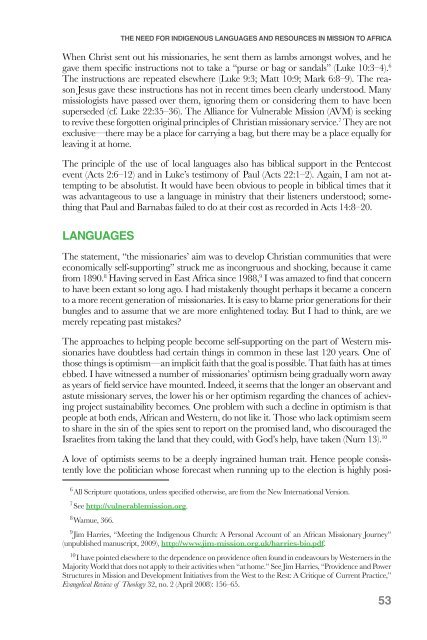VULNERABLE MISSION
VULNERABLE MISSION
VULNERABLE MISSION
You also want an ePaper? Increase the reach of your titles
YUMPU automatically turns print PDFs into web optimized ePapers that Google loves.
THE NEED FOR INDIGENOUS LANGUAGES AND RESOURCES IN <strong>MISSION</strong> TO AFRICA<br />
When Christ sent out his missionaries, he sent them as lambs amongst wolves, and he<br />
gave them specific instructions not to take a “purse or bag or sandals” (Luke 10:3–4). 6<br />
The instructions are repeated elsewhere (Luke 9:3; Matt 10:9; Mark 6:8–9). The reason<br />
Jesus gave these instructions has not in recent times been clearly understood. Many<br />
missiologists have passed over them, ignoring them or considering them to have been<br />
superseded (cf. Luke 22:35–36). The Alliance for Vulnerable Mission (AVM) is seeking<br />
to revive these forgotten original principles of Christian missionary service. 7 They are not<br />
exclusive—there may be a place for carrying a bag, but there may be a place equally for<br />
leaving it at home.<br />
The principle of the use of local languages also has biblical support in the Pentecost<br />
event (Acts 2:6–12) and in Luke’s testimony of Paul (Acts 22:1–2). Again, I am not attempting<br />
to be absolutist. It would have been obvious to people in biblical times that it<br />
was advantageous to use a language in ministry that their listeners understood; something<br />
that Paul and Barnabas failed to do at their cost as recorded in Acts 14:8–20.<br />
LANGUAGES<br />
The statement, “the missionaries’ aim was to develop Christian communities that were<br />
economically self-supporting” struck me as incongruous and shocking, because it came<br />
from 1890. 8 Having served in East Africa since 1988, 9 I was amazed to find that concern<br />
to have been extant so long ago. I had mistakenly thought perhaps it became a concern<br />
to a more recent generation of missionaries. It is easy to blame prior generations for their<br />
bungles and to assume that we are more enlightened today. But I had to think, are we<br />
merely repeating past mistakes?<br />
The approaches to helping people become self-supporting on the part of Western missionaries<br />
have doubtless had certain things in common in these last 120 years. One of<br />
those things is optimism—an implicit faith that the goal is possible. That faith has at times<br />
ebbed. I have witnessed a number of missionaries’ optimism being gradually worn away<br />
as years of field service have mounted. Indeed, it seems that the longer an observant and<br />
astute missionary serves, the lower his or her optimism regarding the chances of achieving<br />
project sustainability becomes. One problem with such a decline in optimism is that<br />
people at both ends, African and Western, do not like it. Those who lack optimism seem<br />
to share in the sin of the spies sent to report on the promised land, who discouraged the<br />
Israelites from taking the land that they could, with God’s help, have taken (Num 13). 10<br />
A love of optimists seems to be a deeply ingrained human trait. Hence people consistently<br />
love the politician whose forecast when running up to the election is highly posi-<br />
6 All Scripture quotations, unless specified otherwise, are from the New International Version.<br />
7 See http://vulnerablemission.org.<br />
8 Wamue, 366.<br />
9 Jim Harries, “Meeting the Indigenous Church: A Personal Account of an African Missionary Journey”<br />
(unpublished manuscript, 2009), http://www.jim-mission.org.uk/harries-bio.pdf.<br />
10 I have pointed elsewhere to the dependence on providence often found in endeavours by Westerners in the<br />
Majority World that does not apply to their activities when “at home.” See Jim Harries, “Providence and Power<br />
Structures in Mission and Development Initiatives from the West to the Rest: A Critique of Current Practice,”<br />
Evangelical Review of Theology 32, no. 2 (April 2008): 156–65.<br />
53


